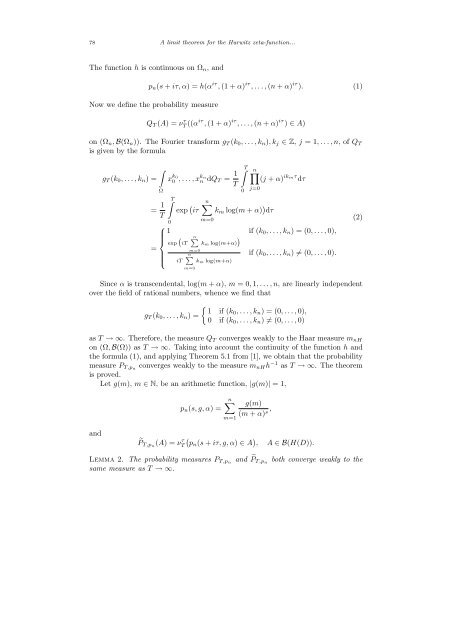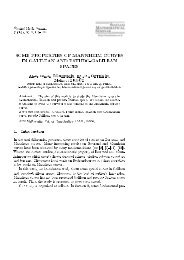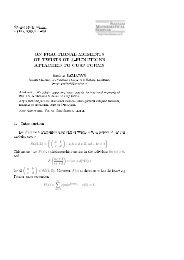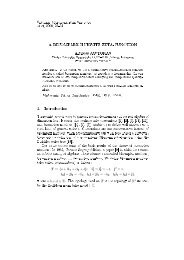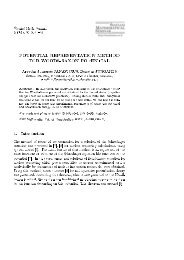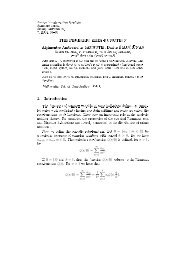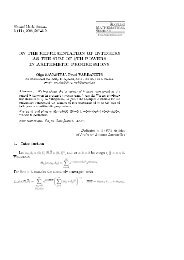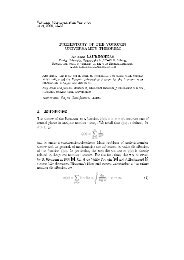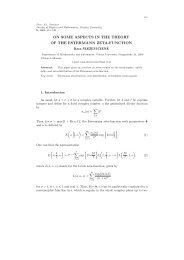a limit theorem for the hurwitz zeta-function in the space of analytic ...
a limit theorem for the hurwitz zeta-function in the space of analytic ...
a limit theorem for the hurwitz zeta-function in the space of analytic ...
You also want an ePaper? Increase the reach of your titles
YUMPU automatically turns print PDFs into web optimized ePapers that Google loves.
78 A <strong>limit</strong> <strong><strong>the</strong>orem</strong> <strong>for</strong> <strong>the</strong> Hurwitz <strong>zeta</strong>-<strong>function</strong>...<br />
The <strong>function</strong> h is cont<strong>in</strong>uous on Ω n , and<br />
p n (s + iτ, α) = h(α iτ , (1 + α) iτ , . . . , (n + α) iτ ). (1)<br />
Now we def<strong>in</strong>e <strong>the</strong> probability measure<br />
Q T (A) = νT τ ((α iτ , (1 + α) iτ , . . . , (n + α) iτ ) ∈ A)<br />
on (Ω n , B(Ω n )). The Fourier trans<strong>for</strong>m g T (k 0 , . . . , k n ), k j ∈ Z, j = 1, . . . , n, <strong>of</strong> Q T<br />
is given by <strong>the</strong> <strong>for</strong>mula<br />
∫<br />
g T (k 0 , . . . , k n ) =<br />
Ω<br />
x k 0<br />
0 , . . . , xkn n dQ T = 1 T<br />
∫ T<br />
∫ T<br />
0<br />
n∏<br />
(j + α) ikmτ dτ<br />
j=0<br />
= 1 exp ( n∑<br />
iτ k m log(m + α) ) dτ<br />
T<br />
0<br />
m=0<br />
⎧<br />
1 if (k 0 , . . . , k n ) = (0, . . . , 0),<br />
⎪⎨<br />
( n∑<br />
)<br />
exp iT k m log(m+α)<br />
=<br />
m=0<br />
n∑<br />
if (k 0 , . . . , k n ) ≠ (0, . . . , 0).<br />
⎪⎩ iT k m log(m+α)<br />
m=0<br />
(2)<br />
S<strong>in</strong>ce α is transcendental, log(m + α), m = 0, 1, . . . , n, are l<strong>in</strong>early <strong>in</strong>dependent<br />
over <strong>the</strong> field <strong>of</strong> rational numbers, whence we f<strong>in</strong>d that<br />
g T (k 0 , . . . , k n ) =<br />
{<br />
1 if (k0 , . . . , k n ) = (0, . . . , 0),<br />
0 if (k 0 , . . . , k n ) ≠ (0, . . . , 0)<br />
as T → ∞. There<strong>for</strong>e, <strong>the</strong> measure Q T converges weakly to <strong>the</strong> Haar measure m nH<br />
on (Ω, B(Ω)) as T → ∞. Tak<strong>in</strong>g <strong>in</strong>to account <strong>the</strong> cont<strong>in</strong>uity <strong>of</strong> <strong>the</strong> <strong>function</strong> h and<br />
<strong>the</strong> <strong>for</strong>mula (1), and apply<strong>in</strong>g Theorem 5.1 from [1], we obta<strong>in</strong> that <strong>the</strong> probability<br />
measure P T,pn converges weakly to <strong>the</strong> measure m nH h −1 as T → ∞. The <strong><strong>the</strong>orem</strong><br />
is proved.<br />
Let g(m), m ∈ N, be an arithmetic <strong>function</strong>, |g(m)| = 1,<br />
p n (s, g, α) =<br />
n∑<br />
m=1<br />
g(m)<br />
(m + α) s ,<br />
and<br />
˜P T,pn (A) = ν τ T<br />
(<br />
pn (s + iτ, g, α) ∈ A ) , A ∈ B(H(D)).<br />
Lemma 2. The probability measures P T,pn and ˜P T,pn both converge weakly to <strong>the</strong><br />
same measure as T → ∞.


